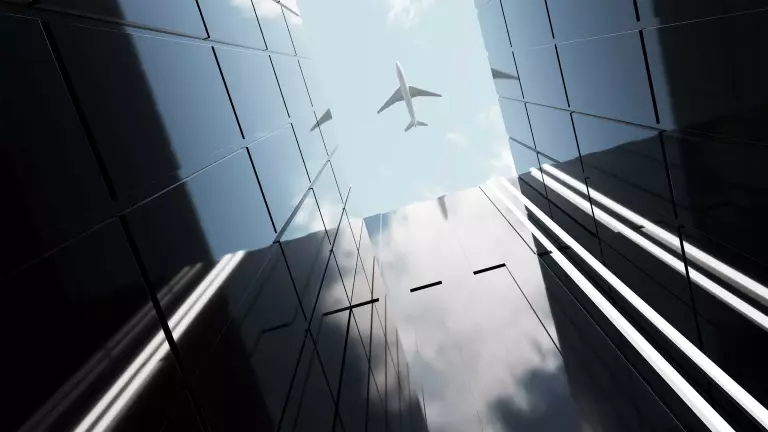Is the airline industry fully capitalizing on the digital revolution? With rising demand, strong cost controls, increasing fee revenues, and solid earnings, the case for transformation may not seem as urgent as it might be in other industries. Still, gathering storm clouds indicate a need for change. These include legacy processes inherited from the 1970s, highly fragmented distribution channels, minimal business model innovation beyond cost management, and the uneven use of data and analytics to improve key operating areas.
Blockchain promises to resolve current issues of trust, security, control, and transparency in a complex ecosystem of industry players.
That all may be about to change, however. Most leading airlines are already experimenting with new digital technologies—such as advanced analytics, robotics, and artificial intelligence—and now blockchain is poised to provide fertile ground for innovation in the industry. With its ability to manage and share data and facilitate digital transactions, blockchain promises to resolve current issues of trust, security, control, and transparency in a complex ecosystem of industry players. Although the technology is still fairly young, airlines are already exploring applications that improve overall performance. Four areas show exceptional promise: customer-related activities; maintenance, repair, and overhaul (MRO); ground operations; and revenue accounting. (See “Where Airlines’ Biggest Blockchain Opportunities Lie.”) What’s more, the technology could usher in a new era of cooperation, collaboration, and alignment within the industry.
WHERE AIRLINES’ BIGGEST BLOCKCHAIN OPPORTUNITIES LIE
WHERE AIRLINES’ BIGGEST BLOCKCHAIN OPPORTUNITIES LIE
Airlines meet the key criteria for blockchain relevance, as the following checklist shows:
- The industry has a complex ecosystem that requires intermediaries. Airlines operate in a network of players that don’t always know or trust each other and must rely on third parties as intermediaries.
- Multiple parties must share data. Different players engage in contractual transactions or must add to, or retrieve, data. Data is spread across a variety of databases and systems, adding to the complexity of data management.
- Data security is critical. Airlines need to record shared data, transactions, records, and contracts in a secure and permanent way, so they are fully traceable and auditable. Traceability is especially important for equipment and maintenance parts, luggage, and high-value shipments in the industry’s complex value chain.
On the basis of these criteria, the areas where blockchain will deliver the greatest potential value are customer-related activities; maintenance, repair, and overhaul; ground operations; and revenue accounting. (See the exhibit below.)
The unique challenges that airlines face—such as high fixed costs, a tightly regulated industry, and the mission-critical nature of their service—make truly disruptive change a rare occurrence. Complicating matters is the complex ecosystem of industry players that airlines must deal with. These include customers (individual, corporate, and cargo), airports, partner airlines, online and offline travel agents, global distribution systems (GDSs), industry associations such as IATA, public authorities, suppliers and service providers, and other travel industry players, such as hotels and car rental companies.
Blockchain has the potential to improve the customer experience while also cutting costs and boosting operational efficiency.
Blockchain Basics
Most people associate blockchain technology with cryptocurrencies, such as bitcoin, that provide a way of transferring money anonymously without an intermediary. At its core, blockchain is a ledger that securely records transactions across a network of participants. Blockchain has four key characteristics. It is:
- Decentralized. The decentralized computer system captures, encrypts, and time stamps each transaction made by any member of the network, and then packages the transactions into data blocks that are continuously recorded in a shared digital ledger.
- Driven by Consensus. A consensus mechanism ensures that all parties agree to any changes and updates made to the ledger.
- Immutable. Because the system is decentralized, there is no single point of failure that can bring it down. Blocks of transactions are organized into an unbroken and growing chain that offers unquestioned data integrity and a “single source of truth.”
- Secure. Since all members of the network hold the same version of the ledger at all times, and the records can’t be altered, blockchain builds trust among network members without the need for the third-party intermediaries that many value chains rely on.
Benefits for the Airline Industry
The current systems landscape in the airline industry is archaic and siloed, which hinders the fast and seamless exchange of data within the intertwined and complicated ecosystem of industry players. Blockchain can address these problems. Its shared nature—built on a decentralized approach to data management, security, and information exchange—can sharply improve speed, transparency, and responsiveness. This saves substantial time and money and paves the way for new business models. With blockchain, airlines can:
- Automate repetitive processes and payments. The ability to create smart contracts—electronic agreements that self-execute according to predefined rules—is generating strong interest in the airline industry. A wide range of transactions can be set up this way, including billing among airlines, billing between travel agents and airlines, determining loyalty settlements, purchasing travel insurance, and paying airport and authority taxes, fees, and charges.
- Improve the customer experience. Most airlines are focusing their blockchain efforts here. When members of an airline’s loyalty program travel on a partner airline, reconciling the miles or points flown and getting those credits correctly applied to the customer’s account can be difficult, error prone, and time-consuming. Smart contracts can simplify and automate the process among airlines, minimize the risk of error, and increase customer satisfaction. Many applications designed to strengthen customer loyalty are emerging. Singapore Airlines has developed a digital wallet that allows customers to use frequent-flyer miles at participating retail merchants, and Cathay Pacific Airways’ loyalty app lets partners and members use their rewards almost immediately, nearly in real time. SITA Lab is testing a blockchain application that would allow passengers to create tokens on their devices that would be accepted across airports and borders.
- Simplify revenue accounting and payment reconciliation. When a ticket is sold, airlines often have to deal with multiple players—such as GDSs, travel agents, or other airlines—and sensitive booking data must be shared. This also gives rise to a complex web of revenues and payments that must be reconciled. Today, airlines rely on IATA, which sets industry standards and acts as a payment clearing-house: the association’s billing settlement plan handles payments between travel agents and airlines, and its clearing-house solution handles interline billing among the airlines themselves. Blockchain could automate and streamline these settlement processes, keep booking data secure, eliminate disputes, and do away with heavy reconciliation work.
- Reduce dependence on intermediaries and reallocate industry value. Airlines have become highly dependent on a handful of third parties that consolidate much of the industry’s decision power—and charge substantial fees and commissions for their services. GDSs distribute available tickets to travel agents, who sell the tickets to individuals and businesses. The top three GDSs control 99% of the market for indirect ticket sales. Online travel agents account for most airline bookings. By reducing these third-party costs, blockchain can increase revenues among network members. Air France–KLM, Air Canada, Lufthansa, and Air New Zealand have partnered with Winding Tree to develop a blockchain app that will allow consumers to access tickets directly from the airlines. In an initiative backed by Russia’s largest commercial bank, S7 Airlines is using blockchain to sell and issue tickets, as well as to insure faster payments between airlines and travel agents.
- Track components, luggage, and shipments. Given the industry’s focus on safety, knowing the source and ensuring the quality of all the components, parts, and other materials that make up an aircraft are critical. In MRO, the complex value chain—which involves manufacturers, component resellers, airlines, service providers, and regulatory authorities—can make getting information on the origin and journey of components a challenge. Blockchain provides transparency throughout the value chain and an auditable record of the sources and histories of all parts and components. This traceability can also extend to baggage and high-value cargo shipments, which are handled by multiple players, including customers, airlines, transportation companies, airports, and local authorities.
- Improve ground operations and on-time departures. By capturing real-time data and tracking completed milestones on the detailed flight checklist, blockchain can help airlines coordinate the activities of all the crew members and service providers—such as cleaners, baggage handlers, catering providers, and airport ground crews—that the companies depend on for on-time departures and identify the source of any delay.
Getting Started
Blockchain is still a fairly young technology whose full potential has yet to emerge. Current challenges—including performance speed and the best way to approach platform and technology governance—are still being resolved. In the meantime, airlines must explore a wide variety of applications and prioritize those that deliver the most business value from a shared data platform. Two models show promise:
- Apply the technology to a closed, private network of players to create a competitive advantage. The payoff of this approach comes from greater efficiencies and the added profits gained by taking business away from other members of the industry ecosystem. Larger industry players are in a particularly good position to lead the development and adoption of these blockchain platforms.
- Apply the technology more broadly across the industry ecosystem through a public or public-permissioned blockchain. In this model, industry players agree to share data (often guided by business rules and a specific governance) and reap the benefits of applications that leverage this shared data to create value. Consortia, alliances, and regulation could enable this type of blockchain platform.
Many observers believe that forming a consortium of partners to run a blockchain is the best way to unlock the technology’s real benefits, although this shared approach is more challenging to coordinate. Because power isn’t consolidated in a single company, governance is more equally distributed, which goes a long way toward overcoming the trust barrier—and enhancing the sharing of information. The airline industry is already well positioned for this approach, given the established alliances and joint ventures among players. For instance, Air France is one of 20 airlines in the SkyTeam alliance, which draws on the flights and connectivity of its member network to offer customers a more seamless travel experience. Similarly, many airlines form joint ventures so that their customers have more options than they would with a single carrier. And across the industry as a whole, airlines have long shared the trusted services of IATA.
Forming a consortium of partners to run a blockchain might be the best way to unlock the technology’s real benefits.
Airlines ought to build on this foundation of cooperation and extend it to blockchain technology, which will require broad-based discussion and agreement among industry players and major changes to industry standards. No airline can go it alone given these industry dynamics—no matter how brilliant a proposed solution. What’s more, a trusted governance structure must be in charge of making key blockchain decisions in a fair and reasoned manner, so that no members of the consortium feel disenfranchised. The best approach may be to start small, testing the waters with existing joint ventures and then scaling up as needed.
Finally, the industry should consider how combining blockchain with technologies such as predictive analytics, robotics, and the internet of things (IoT) can create even greater power and synergies. For instance, in industries where health and safety are primary concerns—such as airlines, food, and pharmaceuticals—the combination of blockchain and IoT can improve quality assurance and proof of provenance throughout the supply chain. As with any new technology, the potential for disruption isn’t always immediately apparent. Forward-looking airlines that use blockchain and other digital technologies to fundamentally rethink how they do business will gain the greatest benefits.






